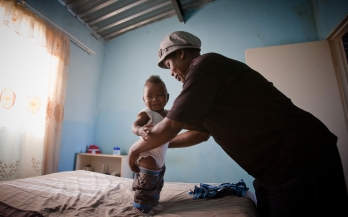This report details the event proceedings and recommendations from the Global Summit on Food Fortification. The Summit was hosted by the Tanzanian Government and GAIN in Arusha, Tanzania in September 2015. The Summit brought together parties interested in large-scale fortification: millers, the food industry, implementing agencies and governments.
Improving the nutrition status of adolescents is vital for future economic growth. This presentation was given by Lawrence Haddad, GAIN's Executive Director at the World Health Assembly 70 side event. The presentation focuses on the need for all stakeholders to make improving nutrition of adolescents a priority.
This presentation was given by Lawrence Haddad, GAIN's Executive Director, at the EAT Forum held in Stockholm in 2017. It focused on three inequalities at the heart of the food system that generate poor nutrition outcomes.
This report outlines the various private sector actors involved in rice fortification, as well as the interests and role of those actors. It offers case studies which further illustrate what the critical role of the private sector has been in various delivery models.
This paper provides a snapshot of new approaches and innovations led by the private sector to shape and change food consumption patterns. It also raises the question of how to build on these models to redress the urgent dietary needs of some two billion undernourished people.
This report presents the potential contribution of market-based solutions to improve the quality of nutrition in the first 1,000 days of a child’s life. It discusses the successes and failures of best practice organisations that successfully sell nutritious complementary foods and supplements for infants in developing countries.
This report presents possible nutrition interventions in agricultural systems for 10 priority global commodity supply chains. In recent years, global attention has focused increasingly on sustainability programs and certification standards for cash and food crops.
This paper forms the third part of a series of three papers exploring the enabling environment, business models, and behaviour change components of GAIN’s Maternal, Infant and Young Child Nutrition portfolio. This paper identifies needs and explore ways to improve access to good quality complementary foods in the context of the promotion of optimal infant and young child feeding and care practices.
This paper examines lessons learned on how to drive consumer awareness, and to ensure uptake and compliant use of product solutions in the context of the Maternal, Infant and Young Child Nutrition programmes.
This paper examines lessons on business models for improved access of product-based options to improve complementary feeding, through market-based or public service delivery.










